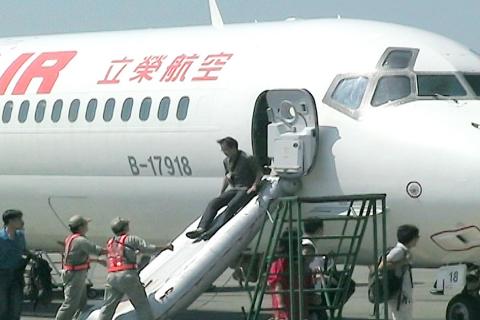Fifteen passengers were slightly injured yesterday as they were evacuated from an Uni Air (立榮航空)/EVA Airways (長榮航空) flight at Taiwan Taoyuan International Airport after smoke was reported coming from one of the plane’s engines.
Flight BR807 bound for Macau was scheduled to depart at 9am, but as the Mcdonnell Douglas MD-90 aircraft was accelerating, the captain noticed an engine warning signal. The captain decided to abort takeoff and taxied the plane back to the C2 ramp for inspection.
After reaching the C2 ramp, ground crew informed the cockpit that they saw smoke coming from the tail pipe of the plane’s No. 1 engine, prompting the captain to evacuate all the passengers.

Photo courtesy of a passenger surnamed Huang
The injuries occurred as passengers used the emergency evacuation slides to leave the plane.
“The 152 passengers descended quickly via the emergency evacuation slides following the instructions of the captain and flight attendants,” EVA spokesperson Nieh Kuo-wei (聶國維) said. “Fifteen passengers were slightly injured during the evacuation. They were able to continue on their trip after being treated by medical professionals.”
The airline apologized for delay and gave each passenger a hongbao (red envelope) and a meal coupon. Passengers finally departed at 2:40pm on a replacement plane.
Television news reports said some passengers complained that the plane had braked suddenly close to takeoff, while others blamed their injuries on skewed evacuation chutes and the lack of personnel on the ground to assist passengers as they slid down the chutes.
One woman said some passengers had asked for another cabin door to be opened because the smell of oil and smoke was making them nauseous, but flight attendants ignored the request.
Authorities said the plane had been in service for 14 years.
The Aviation Safety Council said it would hold a meeting to determine whether it or the Civil Aeronautics Administration should investigate the incident.
The council’s managing director, Thomas Wang (王興中), said the determining factor was whether there had been a fire in the engine.
“If the engine was on fire it would constitute an accident and the council would have to investigate,” Wang said. “If the smoke from the engine was caused by other factors, then it becomes a flight safety incident, which should be investigated by the Civil Aeronautics Administration.”

INVESTIGATION: The case is the latest instance of a DPP figure being implicated in an espionage network accused of allegedly leaking information to Chinese intelligence Democratic Progressive Party (DPP) member Ho Jen-chieh (何仁傑) was detained and held incommunicado yesterday on suspicion of spying for China during his tenure as assistant to then-minister of foreign affairs Joseph Wu (吳釗燮). The Taipei District Prosecutors’ Office said Ho was implicated during its investigation into alleged spying activities by former Presidential Office consultant Wu Shang-yu (吳尚雨). Prosecutors said there is reason to believe Ho breached the National Security Act (國家安全法) by leaking classified Ministry of Foreign Affairs information to Chinese intelligence. Following interrogation, prosecutors petitioned the Taipei District Court to detain Ho, citing concerns over potential collusion or tampering of evidence. The

Seventy percent of middle and elementary schools now conduct English classes entirely in English, the Ministry of Education said, as it encourages schools nationwide to adopt this practice Minister of Education (MOE) Cheng Ying-yao (鄭英耀) is scheduled to present a report on the government’s bilingual education policy to the Legislative Yuan’s Education and Culture Committee today. The report would outline strategies aimed at expanding access to education, reducing regional disparities and improving talent cultivation. Implementation of bilingual education policies has varied across local governments, occasionally drawing public criticism. For example, some schools have required teachers of non-English subjects to pass English proficiency

NEGOTIATIONS: The US response to the countermeasures and plans Taiwan presented has been positive, including boosting procurement and investment, the president said Taiwan is included in the first group for trade negotiations with the US, President William Lai (賴清德) said yesterday, as he seeks to shield Taiwanese exporters from a 32 percent tariff. In Washington, US Trade Representative Jamieson Greer said in an interview on Fox News on Thursday that he would speak to his Taiwanese and Israeli counterparts yesterday about tariffs after holding a long discussion with the Vietnamese earlier. US President Donald Trump on Wednesday postponed punishing levies on multiple trade partners, including Taiwan, for three months after trillions of US dollars were wiped off global markets. He has maintained a 10 percent

TRADE: The premier pledged safeguards on ‘Made in Taiwan’ labeling, anti-dumping measures and stricter export controls to strengthen its position in trade talks Products labeled “made in Taiwan” must be genuinely made in Taiwan, Premier Cho Jung-tai (卓榮泰) said yesterday, vowing to enforce strict safeguards against “origin laundering” and initiate anti-dumping investigations to prevent China dumping its products in Taiwan. Cho made the remarks in a discussion session with representatives from industries in Kaohsiung. In response to the US government’s recent announcement of “reciprocal” tariffs on its trading partners, President William Lai (賴清德) and Cho last week began a series of consultations with industry leaders nationwide to gather feedback and address concerns. Taiwanese and US officials held a videoconference on Friday evening to discuss the